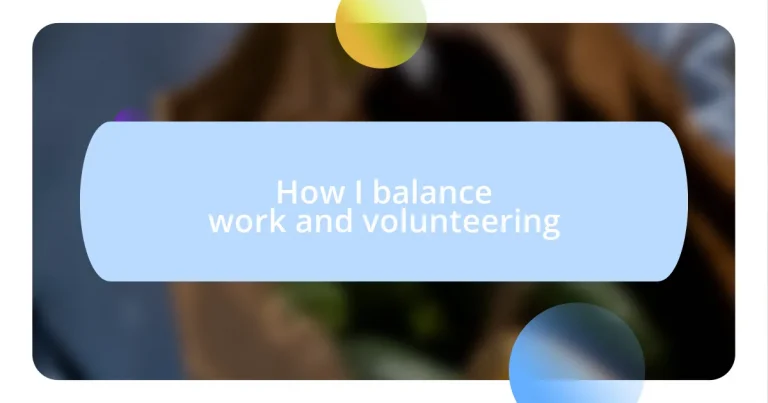Key takeaways:
- Maintaining balance between work and volunteering enhances productivity and personal fulfillment.
- Setting clear priorities and a structured schedule helps manage commitments without feeling overwhelmed.
- Incorporating volunteering into the work routine fosters connections and revitalizes daily tasks.
- Regularly evaluating and adjusting commitments ensures alignment with personal capacity and goals.
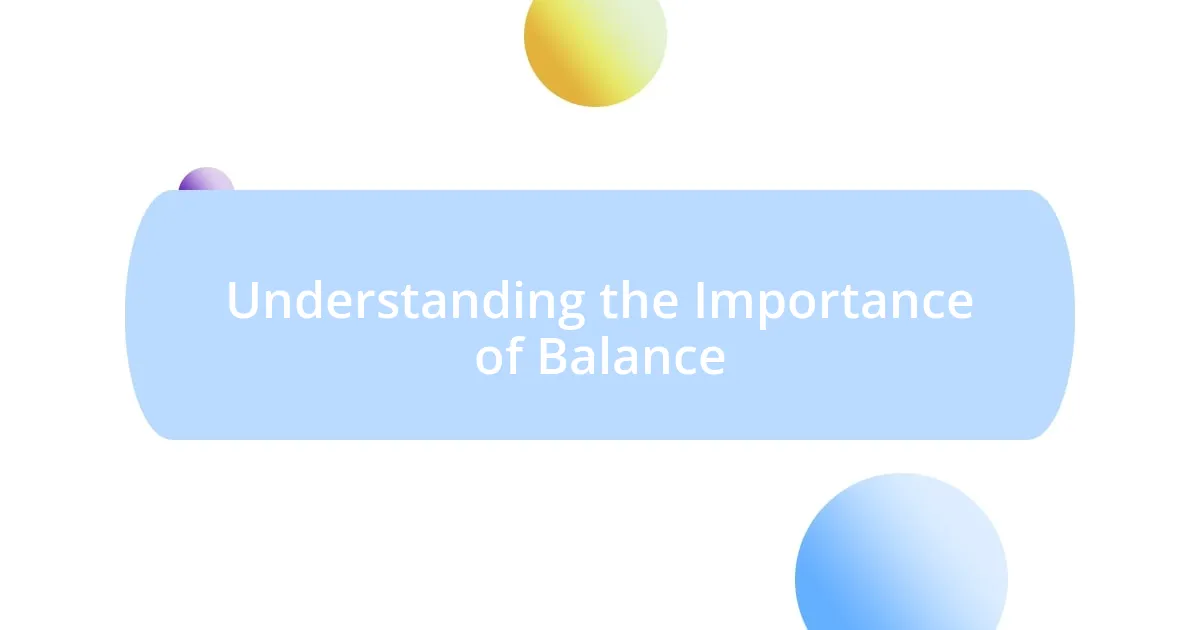
Understanding the Importance of Balance
Finding balance in life is essential for our well-being. When I first started juggling a demanding job with volunteering, I felt overwhelmed. At times, I wondered if I was spreading myself too thin. What I discovered is that maintaining this balance not only enhanced my productivity at work but made my volunteer efforts more meaningful.
Having a balanced approach allows me to recharge. For example, after a long week at the office, I often crave that sense of fulfillment that comes from helping others. I remember one particularly busy month when I felt drained and disconnected. Yet, after volunteering at a local food bank, I returned home feeling invigorated, as if I had tapped into a well of energy I didn’t know was there. How often do we forget that stepping away can actually replenish our drive?
It’s vital to recognize that imbalance can lead to burnout. I’ve learned this the hard way, experiencing moments when work pressures overshadowed my volunteering passions. Those times made me question my commitments and values. Reflecting on those experiences, I now view balance as a crucial ingredient for a fulfilling life—it’s not just about managing time; it’s about nourishing our spirit.
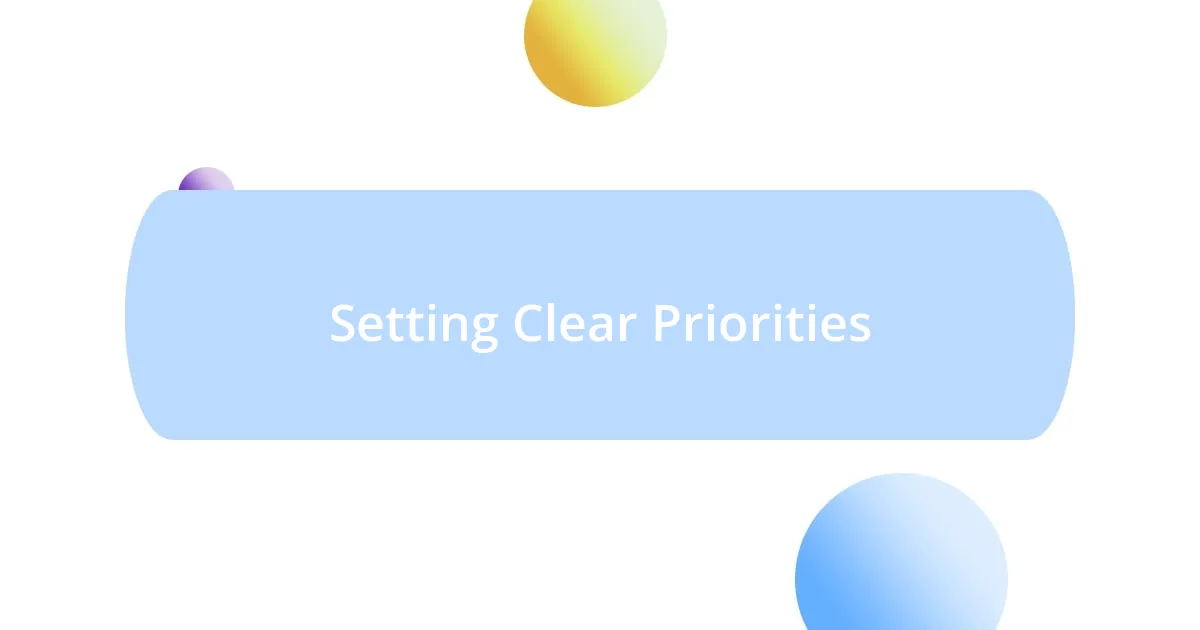
Setting Clear Priorities
When it comes to balancing work and volunteering, setting clear priorities separates the essential from the optional. I’ve realized that having a structured approach helps me allocate my time without feeling stretched thin. One evening, I found myself juggling a work deadline and a volunteer meeting. By prioritizing my responsibilities, I was able to complete my tasks efficiently, freeing up my evening for a community project that truly aligned with my values.
Here’s a simple strategy I use to clarify my priorities:
- Identify what truly matters: Consider your core values and how they align with your professional and volunteer commitments.
- Create a list: Rank your tasks based on urgency and importance, incorporating both work obligations and volunteer opportunities.
- Set boundaries: Determine when to say “no” to additional commitments that don’t resonate with your priorities.
- Regularly reassess: Life changes, and so do priorities—review your commitments frequently to ensure they’re still aligned with your goals.
Finding this balance isn’t always easy, but reflective practices keep me grounded. On days filled with chaos, I often pause and ask myself, “What will make me feel fulfilled today?” This simple question often leads me to what I genuinely value, ensuring I focus my energy where it matters most.
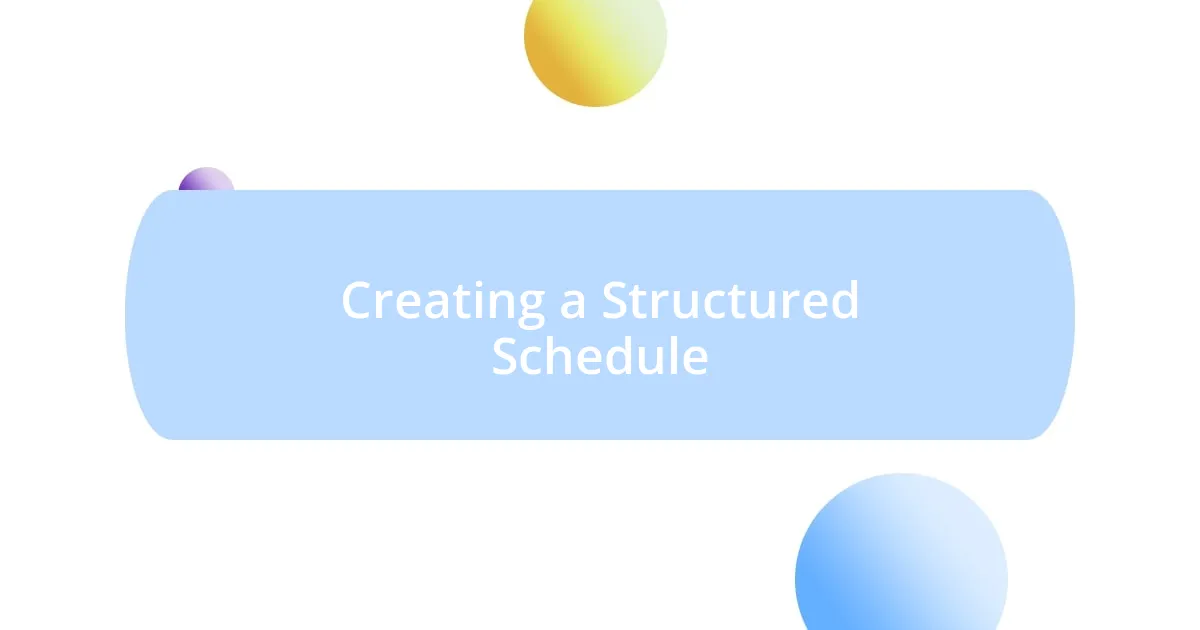
Creating a Structured Schedule
Creating a structured schedule has been a game-changer for my balance between work and volunteering. I use a planner that divides my days into blocks, allowing me to visualize where I’m needed most. There was a time when I approached my week with a loose plan, but often found myself overwhelmed when unexpected events arose. Now, with designated periods for both professional tasks and volunteer commitments, I navigate my schedule with confidence and clarity.
In my experience, consistency is key to maintaining this structure. For example, every Sunday evening, I carve out time to review the upcoming week. I not only list work deadlines but also slot in volunteer activities. I can still remember one Sunday when I realized I hadn’t allocated enough time for my volunteer commitment, which was important to me. By prioritizing these moments each week, I am intentional about making time for what fulfills me.
To further enhance my scheduling technique, I recommend using digital tools that send reminders and alerts. They’ve helped me stay on track and prevent conflicts. I remember the panic of double-booking an important meeting with a volunteer event. That experience taught me the value of technology in organization. Now, I ensure my calendar syncs across devices, creating a seamless experience that keeps me aligned with my commitments.
| Scheduling Technique | Description |
|---|---|
| Time Blocking | Allocate specific periods for work and volunteer tasks, helping to visually balance commitments. |
| Weekly Review | Set aside time at the beginning or end of the week to assess and adjust your schedule as needed. |
| Digital Reminders | Utilize apps or calendar tools to receive notifications for upcoming responsibilities, ensuring no overlap. |
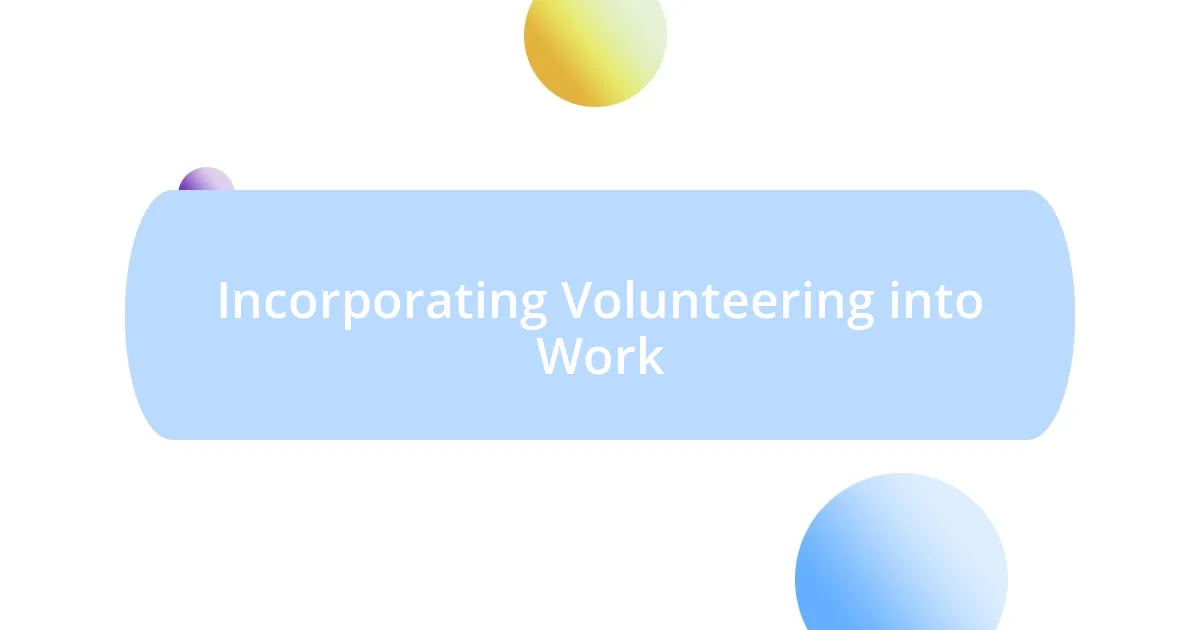
Incorporating Volunteering into Work
Incorporating volunteering into my work routine has brought unexpected joy and deeper connections to my daily life. I remember a time when my workdays felt monotonous, lacking purpose beyond deadlines. Then, I decided to integrate short volunteering sessions during my lunch breaks. Moments spent helping out in a local food pantry not only broke the routine but also left me re-energized, proving that even a small contribution can make a huge impact.
I’ve also found that discussing my volunteer experiences with colleagues can open doors to collaboration. One day, I shared my enthusiasm about a community garden project during a team meeting. To my delight, several coworkers expressed interest in joining me, transforming a solo effort into a group endeavor. This not only enriched our work relationships but fostered a sense of community within the workplace—it’s these shared experiences that often lead to lasting friendships.
Moreover, I practice mindfulness by reflecting on how volunteering aligns with my professional values. When I joined a mentorship program for underprivileged youth, I felt a direct connection to my role at work, where empowerment and growth are core principles. Have you ever experienced that fulfilling connection between different parts of your life? It can create a powerful synergy that enhances both your volunteering and your professional contributions, making your overall experience more meaningful.

Maximizing Your Energy and Focus
Maximizing your energy and focus is crucial when juggling work and volunteering. In my early days of volunteering, I noticed that my enthusiasm often waned by mid-afternoon. I decided to explore energy-boosting practices, and incorporating brief stretches and mindful breathing exercises into my day made a noticeable difference. Let me tell you, even just taking five minutes to breathe deeply can rejuvenate my mind, clearing away the fog and allowing me to tackle both work projects and volunteer tasks with renewed vigor. Have you ever felt that mid-day slump?
I also prioritize hydration and nutrition, which I’ve learned the hard way are vital for maintaining focus. In the past, I’d skip meals or rely on quick snacks, and I paid the price with fatigue and distraction. Now, I prepare healthy snacks in advance and keep water readily available. It’s amazing how something as simple as staying hydrated can drastically boost my productivity. When was the last time you checked in with your body about what it needs?
Additionally, I value the importance of setting boundaries to protect my focus. Early on, I would overcommit, leaving me feeling drained and unfocused. Now, I’ve learned to say no when I’m at my limit, creating space for recharging activities, such as reading or simply enjoying a quiet moment. I find that this balance allows me to bring my best self to both my work responsibilities and my volunteer efforts, which ultimately enhances the quality of everything I do. Have you taken a moment to reflect on what truly energizes you?
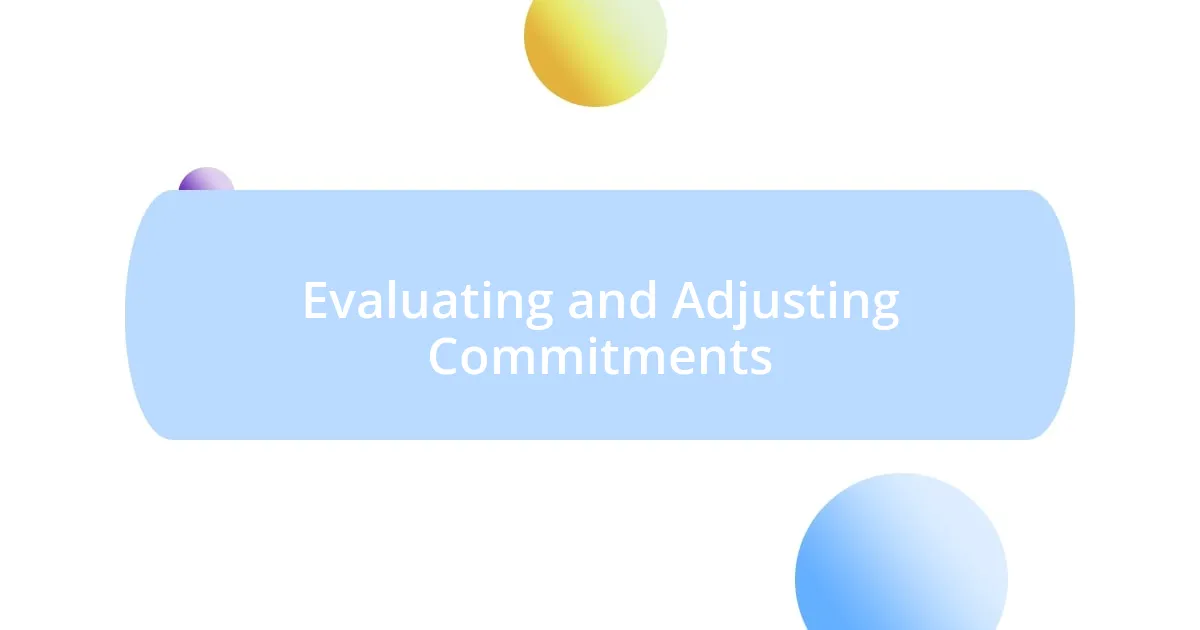
Evaluating and Adjusting Commitments
Evaluating my commitments regularly has been transformative in managing both work and volunteering. For instance, there was a season when I took on too many volunteer roles out of enthusiasm, only to find myself overwhelmed and unable to deliver my best work. Reflecting on this, I learned that not every opportunity aligns with my current capacity or my goals, making it vital to assess my commitments frequently.
I often take time at the end of each month to evaluate how my volunteering activities fit into my life. One month, I realized my passion project was consuming more hours than I’d intended, leading to stress at work. By adjusting my volunteering schedule to every other week, I found a sweet spot that allowed me to engage meaningfully without compromising my professional responsibilities. Doesn’t it feel good to recognize when a tweak can make all the difference?
By embracing a flexible mindset, I’ve discovered that it’s perfectly okay to adjust my commitments as life evolves. For instance, when I transitioned to a new job, I paused my volunteering until I felt settled. It turned out to be a wise decision because it allowed me to fully absorb the demands of my new role. Have you ever thought about how adjusting your commitments can lead to a more balanced and fulfilling life? It certainly can, and I encourage you to evaluate your commitments regularly—it can lead to surprising clarity and relief.
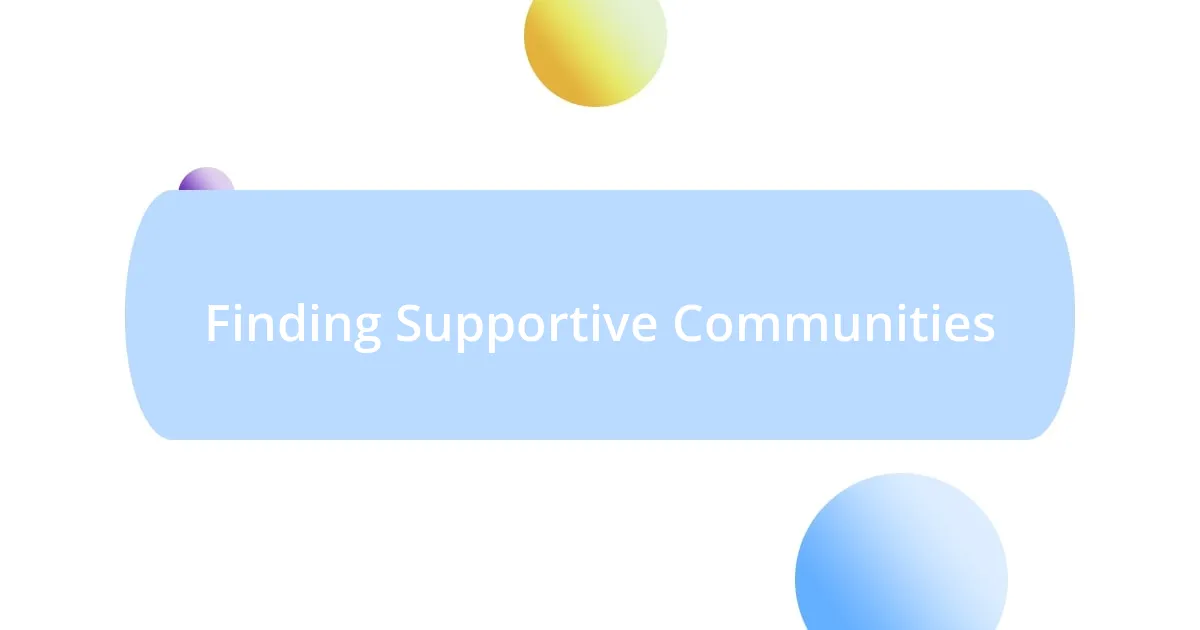
Finding Supportive Communities
Finding supportive communities has been a game-changer in my journey of balancing work and volunteering. Early on, I learned that surrounding myself with like-minded individuals makes a huge difference. For example, when I joined a local volunteer group, I was immediately welcomed into an encouraging environment where everyone shared their challenges and triumphs. Have you ever felt the power of being part of a community that truly understands your passions?
Engaging with supportive networks not only boosts morale but also provides practical resources. During one particularly hectic period, I reached out to a few fellow volunteers who had experience in managing time effectively. They shared tips and tools that transformed my approach, like using a shared calendar for scheduling events, which helped me to visibly see how my commitments fit together. Isn’t it incredible how a little collaboration can lighten the load?
Building these connections often leads to inspiring collaborations. I remember when my volunteering group organized a fundraiser. The collective effort felt electrifying, and together, we raised more than we had initially anticipated. It’s moments like these that ignite a deeper purpose in both my professional and volunteer roles. How have supportive communities enriched your experiences in balancing your commitments?












